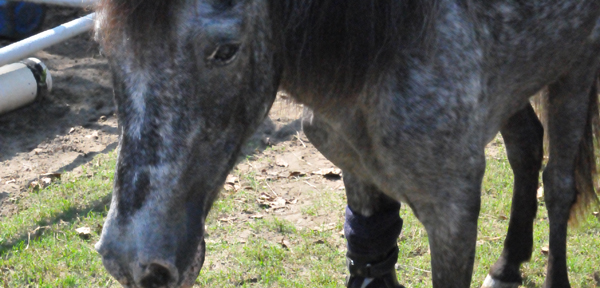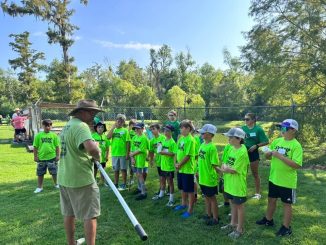
Home of the famous Molly the pony
Molly the pony is a Sea Biscuit kind of story that offers the hope that anyone can triumph over impossible odds with sheer determination and loving friends.
Described as the “The Little Three-Legged Pony That could,” this gray-speckled horse’s tale involves surviving Hurricane Katrina, surviving a Pit Bull dog attack that cost her a front leg and the miraculous intervention by her rescuers Kaye and Glenn Harris who saved her.
The couple own Pony Tales in St. Rose.
When word got out about this pony’s inspiring story, just about everyone wanted to help tell it and it’s time has come again as the 10th anniversary of Hurricane Katrina’s impact on Louisiana approaches on Aug. 29.
The story about a pony successfully getting a prosthetic leg is so incredible that a website called Hoax-Slayer scrutinized it as a possible myth and cheerfully announced it was true.
Not only is it true, but the pony has become a celebrity of world renown.
Molly has been featured in numerous books, including “Molly the Pony: A True Story” and “Horses with a Mission: Extraordinary True Stories of Equine Service.” She’s been featured in a CBS special and featured in the New York Times in 2006, YouTube videos galore and feature stories as far as away as the United Kingdom and Japan (after the tsunami, they wanted to use her story to inspire their people after so many limbs were lost).
The pony is a humanitarian, too.
Molly’s Foundation raises money for her care, as well as fellow rescues that can be a variety of animals but currently includes ponies, horses, dogs, cats, chickens and goats.
Molly’s story seems incredible.
After surviving the hurricane, the pony spent a week on her own with a dog in a storm-damaged barn on the Orleans-Jefferson parish line. Many pets and livestock were left with no one to tend for them after caretakers were killed or evacuated. Gulf Coast residents who were unaffected by the storm began adopting these animals. Among them was Kaye Harris, an owner of Pony Tales in St. Rose, and MuttShack in Los Angeles who rescued more than 3,000 animals and among them was an appaloosa pony named Molly.
Many of the ponies at Pony Tales are rescues, some of them stay on as party ponies or in case while others have been rehabilitated and gone to new homes.
But soon after her rescue, Molly was attacked by a rescued Pit Bull that ripped her jaw, gashed her belly and bit all four of her legs – with her right front leg beyond repair. Harris was turning in her driveway in December of 2005 when she witnessed the dog attacking the pony. As she held the animal’s head in her lap, she worried it would die of shock.
Molly survived but a decision had to be made about her leg.
She approached a close friend, veterinarian Allison Barca, and the two approached Rustin Moore, director of LSU School of Veterinary Medicine’s Equine Health Studies Program. Although three-legged life was a distinct possibility for the pony, they still wanted a prosthetic leg for the horse although it had rarely been attempted and typically resulted in expensive failure.
Moore recognized Molly’s will to survive, as well as her rescuers’ devotion to helping her, and decided she was a good candidate for a procedure that LSU veterinarians had never performed on a horse – amputation and fitting of a prosthetic leg.
“It’s obvious to me that Molly had a bigger role to play in life,” he said. “She survived the hurricane, she survived a horrible injury and now she is giving hope to others.”
Bayou Orthotic and Prosthetic Center was contacted to build Molly’s limb and, although they’d never made a limb for an animal, Dwayne Mara agreed to try. Mara studied ponies for joint movement and horse anatomy to calculate weight for the limb and delivered the artificial leg at no charge. They’ve also donated several replacement legs.
At LSU, Moore and a team of surgeons removed Molly’s leg below the knee and fitted her with a temporary prosthesis.
“She went out and she went right to putting her weight on it,” Harris said. “I just cried because I knew it was going to work.”
When her wound healed, she was fitted with Mara’s inventive prosthetic leg.
“She was timid and pretty easy to work with,” Mara said of Molly, who is still making her prosthetic legs 10 years later.
Molly’s success is partly due to her acceptance of help and the prosthetic.
“She asks for it,” Barca said. “She will put her little limb out and come to you, and let you know that she wants you to put it on.”
Soon after the surgery, the pony was taken to Children’s Hospital and that’s where Harris said Molly surprised them all.
Although the pony could be a “diva” at the farm, she said it insisted on staying with a child who had trouble controlling his movement and then everyone watched the child sit quietly and focus on Molly.
As far as Harris was concerned, the pony had chosen its own job.
“I find one of her biggest therapies is with veterans who have lost limbs,” Harris said. “People think of kids, but old folks and veterans connect with her the most.”
Molly happily went to work going to shelters, hospitals, nursing homes, rehabilitation centers and anywhere anyone needed hope to show what this spunky pony has been able to achieve. Children with medical conditions like spina bifida, who also were being fitted with orthotics, embraced the little horse who had gotten a metal leg.
Now 10 years since her surgery, Molly needs a little more care. Last year, the pony got a pool for water therapy.
While Harris said some have questioned her keeping a lame horse alive, she said she saw a pony that wanted to live and did all they could to help it.
“Molly will never be normal, but she can be better,” she said. “Now, she’s a worldwide ambassador of inspiration.”
As for using the ponies for rides at parties, she said any pony or horse that doesn’t want to or can’t do it doesn’t provide rides. Also, they don’t work the animals more than 10 hours a week, which she said is a good deal considering they get food, board, medical care and attention.
Many of these animals were rejected by their owners, but Harris said they have a home at their farm – whether they work or not.
Also, Molly’s comfort is welcome and timely.
This pony isn’t just surviving, but thriving at a time when so many are honoring the Katrina 10 observance and remembering all the horrific stories that emerged from what remains as the costliest natural disaster and one of the five deadliest hurricanes in U.S. history.
Molly the pony has her own comeback story, having also survived life-defying odds from Katrina.
She’s been so inspiring that Harris called her “a symbol for New Orleans itself.”




Be the first to comment